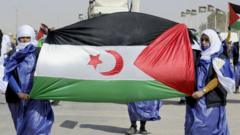The United Kingdom has recently aligned itself with Morocco's plan for Western Sahara, which aims to provide the region with a degree of autonomy while maintaining Moroccan sovereignty. UK Foreign Secretary David Lammy, on a recent visit to Rabat, described the proposal as the "most credible, viable, and pragmatic" solution to end decades of territorial conflict.
This endorsement is not just a diplomatic pivot but a strategic move to incentivize British investments and infrastructure projects linked to the 2030 men's football World Cup, which Morocco is co-hosting with Spain and Portugal. Lammy emphasized the potential for British businesses to capitalize on these developments, stating, “British businesses will score big on football’s biggest stage.”
Historically, British administrations have refrained from taking sides regarding Western Sahara, a territory recognized by the UN as “non-self-governing.” However, the current decision seems to stem from a need for increased British presence in the Moroccan market, particularly in the realm of public tenders and critical projects, such as health sector contracts and improvements to Casablanca's airport.
Algeria, a supporter of the Sahrawi independence movement, has expressed disappointment at the UK's decision, pointing out that Morocco's autonomy plan has not been discussed with the Sahrawi population as a serious negotiating basis. Despite Algeria's opposition, recent shifts in international perspectives towards Morocco have seen backing from several countries, including the United States and various European nations.
The new agreement not only symbolizes a shift in diplomatic affairs but confirms mutual commitments between the nations. Both governments have expressed their respect for non-violence in conflict resolution and acknowledge the principle of self-determination.
Morocco’s Foreign Minister, Nasser Bourita, hailed the UK’s stance as historic, viewing it as a turning point in the longstanding relationship between the two nations. He believes it could pave the way for a definite resolution to the conflict that has persisted for over half a century.
As the UK steps into a more assertive role, it remains to be seen how this political realignment will affect the ongoing discourse surrounding Western Sahara's future and the delicate balance of power in the region. With ongoing UN peacekeeping efforts and a stalled referendum process, the dynamics in Western Sahara will be closely monitored in the months to come.



















